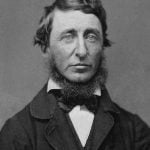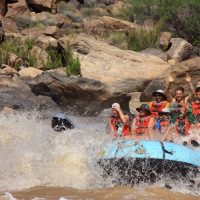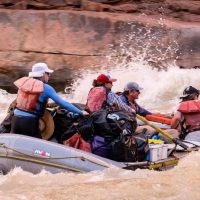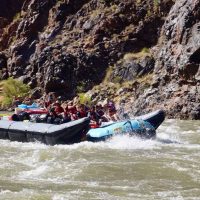99 Western Americana and Historical
Colorado River Runner Quotes
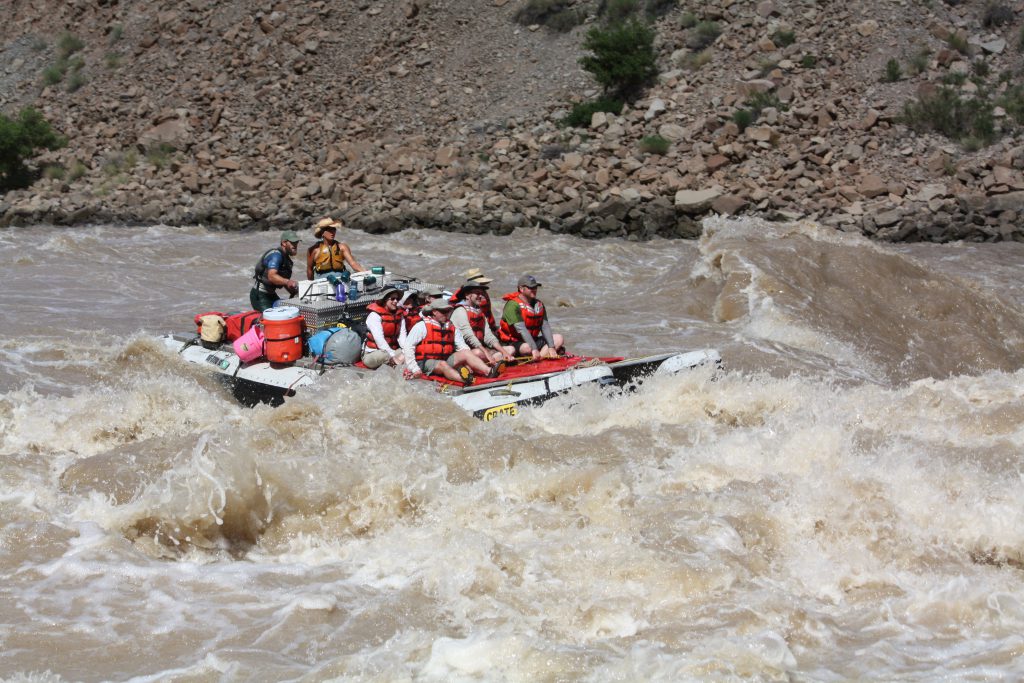
Our Top 3 Picks For Rafting the Colorado River
Why Choose CRATE?
- Under Original Ownership Since 1971
- 5 Star Rated Rafting Trips
- We Provide Everything You Need For a Great Rafting Trip
Book Your Adventure Today!
(800) 253-7328
Home » Rafting Down the River with CRATE » River History & Quotes
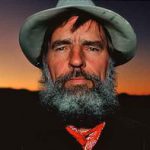 EDWARD ABBEY– Edward Paul Abbey (January 29, 1927 – March 14, 1989) was an American author and essayist noted for his advocacy of environmental issues, criticism of public land policies, and anarchist political views.
EDWARD ABBEY– Edward Paul Abbey (January 29, 1927 – March 14, 1989) was an American author and essayist noted for his advocacy of environmental issues, criticism of public land policies, and anarchist political views.
#1. “Benedicto: May your trails be crooked, winding, lonesome, dangerous, leading to the most amazing view. May your mountains rise into and above the clouds. May your rivers flow without end, meandering through pastoral valleys tinkling with bells, past temples and castles and poets towers into a dark primeval forest where tigers belch and monkeys howl, through miasmal and mysterious swamps and down into a desert of red rock, blue mesas, domes and pinnacles and grottos of endless stone, and down again into a deep vast ancient unknown chasm where bars of sunlight blaze on profiled cliffs, where deer walk across the white sand beaches, where storms come and go as lightning clangs upon the high crags, where something strange and more beautiful and more full of wonder than your deepest dreams waits for you — beyond that next turning of the canyon walls.”
― Edward Abbey
#2. “Better a cruel truth than a comfortable delusion.”
― Edward Abbey
#3. “Wilderness is not a luxury but a necessity of the human spirit, and as vital to our lives as water and good bread. A civilization which destroys what little remains of the wild, the spare, the original, is cutting itself off from its origins and betraying the principle of civilization itself.”
― Edward Abbey, Desert Solitaire
#4 “If my decomposing carcass helps nourish the roots of a juniper tree or the wings of a vulture—that is immortality enough for me. And as much as anyone deserves.”
― Edward Abbey, Desert Solitaire
![]()
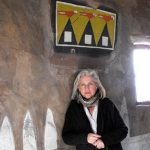 Terry Tempest Williams–Terry Tempest Williams has been called “a citizen writer,” a writer who speaks and speaks out eloquently on behalf of an ethical stance toward life. A naturalist and fierce advocate for freedom of speech, she has consistently shown us how environmental issues are social issues that ultimately become matters of justice.
Terry Tempest Williams–Terry Tempest Williams has been called “a citizen writer,” a writer who speaks and speaks out eloquently on behalf of an ethical stance toward life. A naturalist and fierce advocate for freedom of speech, she has consistently shown us how environmental issues are social issues that ultimately become matters of justice.
#5 “The Eyes of the Future are looking back at us and they are praying for us to see beyond our own time.”
— Terry Tempest Williams
#6 “To be whole. To be complete. Wildness reminds us what it means to be human, what we are connected to rather than what we are separate from.”
— Terry Tempest Williams
![]()
 Craig Childs–Writer and editor. River guide, beginning 1986. Worked as editor, writer, photographer, and mechanic for Colorado newspapers, including Ouray County Plaindealer and Ridgeway Sun, 1990-92. Previous jobs included jazz musician, gas station attendant, beer bottler, college field instructor.
Craig Childs–Writer and editor. River guide, beginning 1986. Worked as editor, writer, photographer, and mechanic for Colorado newspapers, including Ouray County Plaindealer and Ridgeway Sun, 1990-92. Previous jobs included jazz musician, gas station attendant, beer bottler, college field instructor.
#7 “Most animals show themselves sparingly. The grizzly bear is six to eight hundred pounds of smugness. It has no need to hide. If it were a person, it would laugh loudly in quiet restaurants, boastfully wear the wrong clothes for special occasions, and probably play hockey.
—Craig Childs
![]()
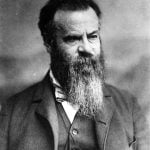 John Wesley Powell (March 24, 1834 – September 23, 1902) was a U.S. soldier, geologist, explorer of the American West, professor at Illinois Wesleyan University, and director of major scientific and cultural institutions. He is famous for the 1869 Powell Geographic Expedition, a three-month river trip down the Green and Colorado rivers, including the first official U.S. government-sponsored passage through the Grand Canyon.
John Wesley Powell (March 24, 1834 – September 23, 1902) was a U.S. soldier, geologist, explorer of the American West, professor at Illinois Wesleyan University, and director of major scientific and cultural institutions. He is famous for the 1869 Powell Geographic Expedition, a three-month river trip down the Green and Colorado rivers, including the first official U.S. government-sponsored passage through the Grand Canyon.
#8. “You cannot see the Grand Canyon in one view, as if it were a changeless spectacle from which a curtain might be lifted, but to see it, you have to toil from month to month through its labyrinths.”
–John Wesley Powell
#9 “We have an unknown distance yet to run, an unknown river to explore. What falls there are, we know not; what rocks beset the channel, we know not; what walls ride over the river, we know not. Ah, well! we may conjecture many things.”
—John Wesley Powell
#10 “The Grand Canyon, is a land of song. Mountains of music swell in the rivers, hills of music billow in the creeks, and meadows of music murmur in the rills that ripple over the rocks. Altogether it is a symphony of multitudinous melodies. All this is the music of waters. The adamant foundations of the earth have been wrought into a sublime harp, upon which the clouds of the heavens play with mighty tempests or with gentle showers.”
#11 “The landscape everywhere, away from the river, is of rock—cliffs of rock; plateaus of rock; terraces of rock; crags of rock—ten thousand strangely carved forms; rocks everywhere, and no vegetation, no soil, no sand. In long, gentle curves the river winds about these rocks.”
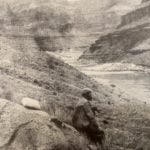 Robert Brewster Stanton (5 August 1846, Woodville, Mississippi – 23 February 1922, New Canaan, Connecticut) was a United States civil and mining engineer. He was chief engineer of an expedition investigating the Grand Canyon for a possible railroad line in 1889-90, and investigated many mining properties.
Robert Brewster Stanton (5 August 1846, Woodville, Mississippi – 23 February 1922, New Canaan, Connecticut) was a United States civil and mining engineer. He was chief engineer of an expedition investigating the Grand Canyon for a possible railroad line in 1889-90, and investigated many mining properties.
#12 ” About midnight, I was awakened by a terrific peal of thunder, and around me and over me raged one of the most awful storms it has been my fate to witness. I have seen the lightning play, and heard the thunder roll, among the summit peaks of the Rocky Mountains, as I have stood on some rocky point far above the clouds, but nowhere has the awful grandeur equaled that night in the lonesome depths of what was, to us, death’s canyon.”
–Robert Brewster Stanton
#13 “We were now about to enter, and attempt to pass through the most stupendous chasm on the globe. Approaching it after months of hardships, dangers, starvation and death, the feelings that came to us during the first few days in the depths of the black granite gorge would be most difficult to describe.”
–Robert Brewster Stanton
#14 “We soon came to what was claimed by Major Powell as being the greatest single declivity on the River, at the head of the most noted rapid which; as early as 1872, received a distinct name and has kept it ever since. It was called the “Sockdolager.” It is formed at its head by a dam of boulders washed out of the little side gulch, with immense blocks of rock broken down from the adjoining cliff lying just above the beginning of the fall, and, below that, the water tumbles over quite a number of ledges in the granite, making one continuous, raging torent for a distance of 1,800 to 2,000 feet. In low water, that portion at the head is for some distance very dangerous, on account of the exposed and sunken rocks; while below, it is but a matter of the power of the waves breaking in every direction as the current rushes down a rock hewn trough.”
–Robert Brewster Stanton
#15 “As McDonald said, extra work was placed upon him by his skill and the want of skill of some of the other men.”
–Robert Brewster Stanton
#16 “Wild explorations and journeys through the wilderness usually develop a reckless, devil may care spirit that is not true bravery. It requires a different kind of courage to continue, day after day, the facing of death in the rapids of the River, in the bowels of the earth, and at the same time the possibility of starvation, without being able to retreat.”
–Robert Brewster Stanton
#17 “On the other hand, the dash into the great rapids, particularly the one where I came near losing my life, was made with a joy of anticipation that it is a pleasure, even to this day, I lay down at night I had hardly pulled the blankets over me till I was sound asleep, and I slept peacefully until the morning.”
–Robert Brewster Stanton
![]()
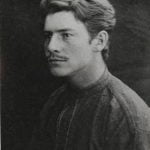 Frederick Samuel Dellenbaugh (1853–1935) was an American explorer. From 1871 to 1873, he was artist and assistant topographer with Major Powell’s second expedition down the Colorado River. He joined the 1899 Harriman Alaska Expedition financed by railroad magnate E. H. Harriman. He served as librarian of the American Geographical Society (1909–1911), and became a fellow of the American Ethnological Society. He helped to found the Explorers Club in 1904.
Frederick Samuel Dellenbaugh (1853–1935) was an American explorer. From 1871 to 1873, he was artist and assistant topographer with Major Powell’s second expedition down the Colorado River. He joined the 1899 Harriman Alaska Expedition financed by railroad magnate E. H. Harriman. He served as librarian of the American Geographical Society (1909–1911), and became a fellow of the American Ethnological Society. He helped to found the Explorers Club in 1904.
#18 “Beautiful is the wilderness at all times, at times lovely, but under the spell of twilight it seems to enfold one in a tender embrace, pushing back the sordid, the commonplace, and obliterating those magnified nothings that form the weary burden of civilized man.”
–Frederick S. Dellenbaugh
#19 “Beautiful is the wilderness at all times, at times lovely, but
under the spell of twilight it seems to enfold one in a tender
embrace, pushing back the sordid, the commonplace, and obliterating
those magnified nothings that form the weary burden of civilized
man.”
–Frederick S. Dellenbaugh
![]()
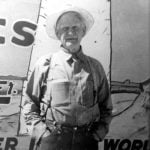 Albert A. “Bert” Loper (July 31, 1869 – July 8, 1949) was a pioneer of the sport of whitewater river-running in the American Southwest, particularly the Colorado River and its tributaries. He along with many of the noted boatmen of his era, including Charles Russell, Julius Stone, Ellsworth Kolb, and others, were among the first (and last) people to navigate the Colorado River before the construction of Glen Canyon Dam and Navajo Dam.
Albert A. “Bert” Loper (July 31, 1869 – July 8, 1949) was a pioneer of the sport of whitewater river-running in the American Southwest, particularly the Colorado River and its tributaries. He along with many of the noted boatmen of his era, including Charles Russell, Julius Stone, Ellsworth Kolb, and others, were among the first (and last) people to navigate the Colorado River before the construction of Glen Canyon Dam and Navajo Dam.
#20 “I belong to the wonderous West, and the West belongs to me.”
–Bert Loper
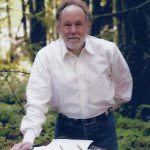 Barry Holstun Lopez (born January 6, 1945) is an American author, essayist, and fiction writer whose work is known for its humanitarian and environmental concerns. He won the National Book Award for Nonfiction for Arctic Dreams (1986) and his Of Wolves and Men (1978) was a National Book Award finalist.
Barry Holstun Lopez (born January 6, 1945) is an American author, essayist, and fiction writer whose work is known for its humanitarian and environmental concerns. He won the National Book Award for Nonfiction for Arctic Dreams (1986) and his Of Wolves and Men (1978) was a National Book Award finalist.
#21 “I do not know, really, how we will survive without places like the Inner Gorge of the Grand Canyon to visit. Once in a lifetime, even, is enough. To feel the stripping down, an ebb of the press of conventional time, a radical change of proportion, an unspoken respect for others that elicits keen emotional pleasure, a quick intimate pounding of the heart.
― Barry López
#22 “The living of life, any life, involves great and private pain, much of which we share with no one. In such places as the Inner Gorge the pain trails away from us. It is not so quiet there or so removed that you can hear yourself think, that you would even wish to; that comes later. You can hear your heart beat. That comes first.”
― Barry López
#23 “To put your hands in a river is to feel the chords that bind the earth together.”
–Barry Lopez
![]()
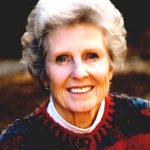 Ann Haymond Zwinger (1925–2014) was the author of many natural histories noted for detail and lyrical prose.
Ann Haymond Zwinger (1925–2014) was the author of many natural histories noted for detail and lyrical prose.
#24 “I sit watching until dusk, hypnotized. I think of the sea as continually sloshing back and forth, repetitive, but my psyche goes with the river- always loping downhill, purposeful, listening only to gravity.”
― Ann Zwinger
![]()
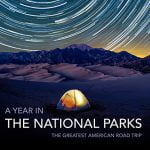 On January 1 of 2016, Stefanie Payne, a creative professional working at NASA Headquarters, and Jonathan Irish, a photographer with National Geographic, left their lives in Washington, D.C. and hit the open road on an expedition to explore and document all 59 of America’s national parks during the centennial celebration of the U.S. National Park Service – 59 parks in 52 weeks – the Greatest American Road Trip.
On January 1 of 2016, Stefanie Payne, a creative professional working at NASA Headquarters, and Jonathan Irish, a photographer with National Geographic, left their lives in Washington, D.C. and hit the open road on an expedition to explore and document all 59 of America’s national parks during the centennial celebration of the U.S. National Park Service – 59 parks in 52 weeks – the Greatest American Road Trip.
#25 “There will never be a photograph of the Grand Canyon that can adequately describe its depth, breadth, and true beauty.”
― Stefanie Payne![]()
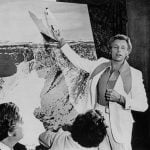 Robert Craig Knievel ( October 17, 1938 – November 30, 2007), professionally known as Evel Knievel, was an American stunt performer and entertainer. Over the course of his career, he attempted more than 75 ramp-to-ramp motorcycle jumps. Knievel was inducted into the Motorcycle Hall of Fame in 1999. He died of pulmonary disease in Clearwater, Florida, in 2007, aged 69.
Robert Craig Knievel ( October 17, 1938 – November 30, 2007), professionally known as Evel Knievel, was an American stunt performer and entertainer. Over the course of his career, he attempted more than 75 ramp-to-ramp motorcycle jumps. Knievel was inducted into the Motorcycle Hall of Fame in 1999. He died of pulmonary disease in Clearwater, Florida, in 2007, aged 69.
#26 “You can’t say you’re going to jump the Grand Canyon and then jump some other canyon.”
–Evel Knievel
#27- “I love the feeling of the fresh air on my face and the wind blowing through my hair.”
–Evel Knievel
![]()
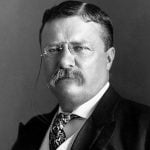 Theodore Roosevelt Jr. (October 27, 1858 – January 6, 1919) was an American statesman, politician, conservationist, naturalist, and writer who served as the 26th president of the United States from 1901 to 1909.
Theodore Roosevelt Jr. (October 27, 1858 – January 6, 1919) was an American statesman, politician, conservationist, naturalist, and writer who served as the 26th president of the United States from 1901 to 1909.
#28 “Life is a great adventure…accept it in such a spirit.”
Theodore Roosevelt
#29 “In the Grand Canyon, Arizona has a natural wonder which is in kind absolutely unparalleled throughout the rest of the world. I want to ask you to keep this great wonder of nature as it now is. I hope you will not have a building of any kind, not a summer cottage, a hotel or anything else, to mar the wonderful grandeur, the sublimity, the great loneliness and beauty of the canyon. Leave it as it is. You cannot improve on it. The ages have been at work on it, and man can only mar it.”
–Theodore Roosevelt
#30 “There are no words that can tell the hidden spirit of the wilderness, that can reveal its mystery, its melancholy, and its charm.”
–Theodore Roosevelt
#31 “We are prone to speak of the resources of this country as inexhaustible; this is not so.”
–Theodore Roosevelt
#32 “…wild flowers should be enjoyed unplucked where they grow.”
–Theodore Roosevelt
#33 “The lack of power to take joy in outdoor nature is as real a misfortune as the lack of power to take joy in books.”
–Theodore Roosevelt
#34 “There can be nothing in the world more beautiful than the Yosemite, the groves of the giant sequoias and redwoods, the Canyon of the Colorado, the Canyon of the Yellowstone, the Three Tetons; and our people should see to it that they are preserved for their children and their children’s children forever, with their majestic beauty all unmarred.”
–Theodore Roosevelt
![]()
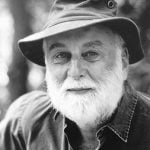 Colin Fletcher (14 March 1922 – 12 June 2007) was a pioneering backpacker and writer. In 1963, Fletcher walked the length of that portion of Grand Canyon contained within the 1963 boundaries of Grand Canyon National Park. Although his route spans only a little more than one-third the length of Grand Canyon, Fletcher was only the second person to complete this section and the first to accomplish the feat “in one go” — as chronicled in his bestselling 1968 memoir The Man Who Walked Through Time.
Colin Fletcher (14 March 1922 – 12 June 2007) was a pioneering backpacker and writer. In 1963, Fletcher walked the length of that portion of Grand Canyon contained within the 1963 boundaries of Grand Canyon National Park. Although his route spans only a little more than one-third the length of Grand Canyon, Fletcher was only the second person to complete this section and the first to accomplish the feat “in one go” — as chronicled in his bestselling 1968 memoir The Man Who Walked Through Time.
#35 “There is a powerful human compulsion to leave things tied up in neat little bundles. But every journey except your last has an open end. And any journey of value is above all a chapter in a personal odyssey. Its end is not so much a goal attained as another point in a continuing process. And the important thing at the end of a journey–or of a book–is to keep moving forward, refreshed, with as little pause as possible.”
― Colin Fletcher
#36 “There is nothing like a wilderness journey for rekindling the fires of life. Simplicity is part of it. Cutting the cackle. Transportation reduced to leg – or arm – power, eating irons to one spoon. Such simplicity, together with sweat and silence, amplify the rhythms of any long journey, especially through unknown, untattered territory. And in the end such a journey can restore an understanding of how insignificant you are and thereby set you free.”
#38 “It is always there, of course, when you come back from the green world. You have been living by sunrise and sunset, by wind and rain, surrounded by the ebb and flow of lives that respond only to such simple, rhythmic elements.”
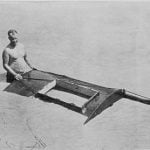 Lewis Ransome Freeman (4 October 1878, Genoa Junction, Wisconsin – 6 November 1960 Pasadena, California) was an American explorer, journalist and war correspondent who wrote over twenty books chronicling his many travels, as well as numerous articles. Freeman was invited to participate in the 1923 United States Geological Survey (USGS) of the Colorado River in Grand Canyon by E. C. LaRue. He had piloted a boat for the 1922 USGS survey of Glen Canyon. Freeman’s flamboyant articles about the 1922 trip were a contributing factor to his being invited to participate in the 1923 trip. On the Grand Canyon cruise, Freeman’s nickname was “The Gorilla.”
Lewis Ransome Freeman (4 October 1878, Genoa Junction, Wisconsin – 6 November 1960 Pasadena, California) was an American explorer, journalist and war correspondent who wrote over twenty books chronicling his many travels, as well as numerous articles. Freeman was invited to participate in the 1923 United States Geological Survey (USGS) of the Colorado River in Grand Canyon by E. C. LaRue. He had piloted a boat for the 1922 USGS survey of Glen Canyon. Freeman’s flamboyant articles about the 1922 trip were a contributing factor to his being invited to participate in the 1923 trip. On the Grand Canyon cruise, Freeman’s nickname was “The Gorilla.”
#39 “I had told myself from the outset that the point where sea-tide vanquished river-tide would be the logical place at which to bring my voyage down the Colorado to a finish.”
–Lewis R. Freeman
#40 “I saw all of the bottom-boards of the boat as it was flung on its side; then the flick of a flying oar and the sprawling body of a man silhouetted against the cliff below as it hurtled through the air.”
–Lewis R. Freeman describing the right side run of “The Glen” in the recently formed rapid now called President Harding in 1923.
#41 “There proved to be nothing at the mouth of the Little Colorado resembling even remotely the great whirlpool located there by James White in his lurid account of a raft voyage through the Grand Canyon…makes the averred adventure of the Colorado prospector appear more utterly absurd than ever”
Lewis R. Freeman
#42 “Not far above Tapeats Creek my poor judgement in running almost into the middle of a viciously tumbling rapid brought the stern of the “Grand” into solid and violent collision with a very firmly planted boulder. That the boat did not telescope is an excellent testimonial to the strength of its construction.”
–Lewis R. Freeman
#43 “An incipient leak from a crushed-in quarter was effectually closed with a patch of canvas and white lead. A lusty wallop on the nose by the handle of a back-kicking oar at the instant of impact was the only violence I suffered personally as a penalty for a collision which should not have been allowed to happen. This mishap appears to have occurred in the same rapid in which Deubendorff, of the Stone party, was upset and roughly rolled in 1908.”
–Lewis R. Freeman
#44 “The distinction for the first upset fell to Kolb while trying to run a rough and hitherto-unnamed rapid a few miles above Havasu Creek. It occurred as a consequence of allowing his boat to draw into a deep hole under a large boulder, where it capsized cupping him under the cockpit. He bobbed up a hundred feet farther down and climbed out on the bottom of the overturned boat With the assistance of Dodge, who jumped in and swam out to the derelict, it was brought to the bank three hundred yards below the foot of the portage, and subsequently lined back. Neither boat nor boatman was injured. The event was commemorated in the name of the rapid—-“Upset.”
–Lewis R. Freeman
#45 “The illuminated strip of rollers was a ghostly grey, and the effect curiously like that of a wind billowed canvas.”
–Lewis R. Freeman
#46 “There was zest and exhilaration in the blind ride in the half-moonlight down the edge of the booming rapid; the tortuous tramp back through the swamp of the hot springs was sodden grief all the way.”
–Lewis R. Freeman
#47 “The rapid had altered in character overnight beyond belief. The head of the dam of boulders, where the previous day there had been a series of abrupt falls, was now completely submerged—drowned out. Over it rushed a broad, solid shoot of wildly running water which did not begin to break into waves until half way down what had formerly been the rapid. From there on the combers were tremendous; quite the largest we had seen. These culminated in an enormous uptossed mass of churning, surging water just above where the boats were moored: a point at which yesterday there was only a swift but comparatively smooth stretch of current. This wave was a great boil or fountain, which at times measured all of from fifteen to twenty feet from the trough to crest. It appeared to be caused by conflicting currents rather than by a rock, and rarely assumed the same form twice in succession. At times, in breaking back, it cupped down a large quantity of air, which when compressed threw out jets of spume like that from a cavernous blow-hole on the ocean shore.”
–Lewis R. Freeman-describing Lava Falls at 125,000 cfs on 1923 USGS trip
![]()
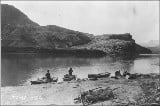
Julius Stone (June 1, 1855 to July 25, 1947) Businessman, Philanthropist, and Adventurer. Julius Stone, along with Nathaniel Galloway and Seymour Dubendorf did a river trip from Green River, Wyoming all the way through the Grand Canyon in 1908. Stone organized the trip with no intention of anything except for the pleasure of running the river. It was the first river trip of this kind. They did not prospect, map, trap, or try to build railroads. They did the trip for fun!
#48 “The walls have now risen to a great height and are grand beyond description. What a pity it is that the spoken word cannot approach the visual elogance of nature! Here it seems to outrun even the grasp of the imagination.”
–Julius Stone
#49 “Here, as in several previous instances we do not agree among ourselves as to the best method of running rapids. Galloway picks his course along the right where there are quite a number of rocks but no big waves. I incline to the open water, even though it is rough, while Dubie, coming last, avails himself of the route taken by the one who gets through most easily.”
–Julius Stone-Scouting what is now Dubendorf Rapid Monday November 8, 1908.
#50 “Galloway goes ahead, I next, and dropping into an eddy below the first rock I see he has been unable to follow the course he picked out. His boat strikes a partly submerged rock twenty feet from the place he tried to reach. This conforms my decision that the heavy water is safer. For me it turns out to be correct, as I go through all o.k., getting wet, of course. However on looking around at the first opportunity to do so safely, I see Dubie’s boat on the crest of a big wave near the upper end of the rapid. Then it goes out of sight, reappears in the act of turning over almost endwise, and comes down bottom up. Now and then I glimpse his head bobbing up a moment, then disappearing again, but out of sight the greater part of the time.”
–Julius Stone-November 8, 1908
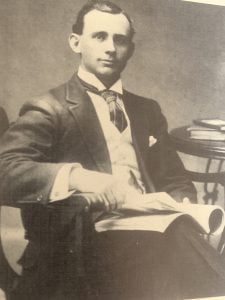 #51 “I’d like to try this again. I know I can run it.”
#51 “I’d like to try this again. I know I can run it.”
–Seymour Dubendorf
#52 “He is as gritty as a flapjack rolled in sand. But all’s well that ends well, for we soon cross to the left bank, build a fire in a sheltered spot (wood is a little scarce) and warm ourselves. I tinker up the cut in Dubie’s head. The wet stuff is spread out on the rocks to dry and, but for a broken oar there soon is small evidence of trouble.”
–Julius Stone
#53 “In rapid no. 172 one of Dubendorf’s oarlocks pulled out of its socket, he not having them properly wired in. He narrowly escaped being wrecked on a sharp rock on the right. As a matter of precaution we stopped at once and secured them properly.”
–Julius Stone
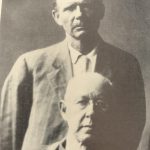 #54 Last night Galloway shaved and washed himself carefully. He has done this at three or four bad places, but not elsewhere. Dubendorf and I are wondering whether it is not due to some little superstition, but as we probably have other kinks that seem equally queer to him, we call it a stand-off.
#54 Last night Galloway shaved and washed himself carefully. He has done this at three or four bad places, but not elsewhere. Dubendorf and I are wondering whether it is not due to some little superstition, but as we probably have other kinks that seem equally queer to him, we call it a stand-off.
–Julius Stone
![]()
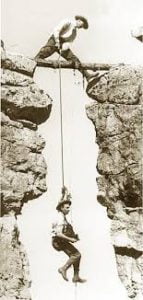 In 1902, Emery C. Kolb (1881-1976) and Ellsworth L. Kolb (1876-1960) first arrived at the south rim of the Grand Canyon. In 1911, they successfully navigated the Colorado River, filming their journey.
In 1902, Emery C. Kolb (1881-1976) and Ellsworth L. Kolb (1876-1960) first arrived at the south rim of the Grand Canyon. In 1911, they successfully navigated the Colorado River, filming their journey.
#55 “What a din that water sent up! We had to yell to make ourselves heard. The air vibrated with the impact of water against rock. The rapid was nearly half a mile long. There were two sections near its head staggered with great rocks, forty of them, just above or slightly submerged under the surface of the water. Our low stage of water helped us, so that we did not have to line the boats from the ledge, eighty feet above the water, as others had done. The rapid broke just below the lower end of the sheer rock, which extended twenty feet beyond the irregular shore.”
–Ellsworth Kolb-describing Lava Cliff Rapid
#56 “To some, nothing looks big; to others, every little danger is unconsciously magnified out of all proportion.”
–Ellsworth Kolb
#57 There is a certain amount of danger in the canyons–plenty of it.
–Ellsworth Kolb
#58 “The fouth rapid below the Bass Trail was bad, but after looking it over we decided it could be run. We had taken chances in rapids that looked worse and came through unharmed; if we were successful here, it would be over in a few minutes, and forgotten an hour later. So we each made the attempt.”
–Emery Kolb talking about what would become Walthenburg Rapid
#59 “Ellsworth went first taking the left-hand side. I picked out a course on the right as being the least dangerous; but I was scarcely started when I found myself on a nest of jagged rocks, with violent water all about me, and with other rocks, some of them submerged, below me. I climbed out on the rocks and held the boat.”
–Emery Kolb talking about what is now called Walthenburg Rapid
#60 “Then I saw that the Defiance was in trouble. She was caught in a reverse whirl in the very middle of the pounding rapid, bouncing back and forth like a great rubber ball. Finally she filled with the splashing water, sank low, and the water pouring over the rock caught the edge of the twelve-hundred pound boat and turned her over as if she were a toy; my brother was holding to the gunwhale when she turned. Still she was held in the whirl, jumping as violently as ever, then turned upright again and was forced out. Ellsworth had disappeared, but came up nearly a hundred feet below, struggling to keep on top but going down with every breaking wave.”
–Emery Kolb talking about What is now Walthenburg Rapid
#61 “I pried the boat loose, jumped in as she swung clear, and pulled with all my might, headed toward the center of the river. I was almost clear when I was drawn over a dip, bow first, and struck a glancing blow against another rock I had never seen. There was a crash, and the boards broke like egg-shells. It was all done in a few moments. The Edith was a wreck, I did not know how bad.”
–Emery Kolb talking about what is now Walthenburg Rapid
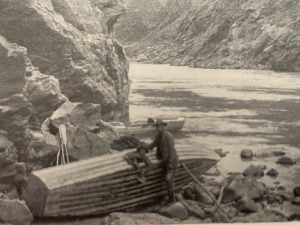 #62 “We repaired the boat on Christmas day. Three smashed side ribs were replaced with mesquite, which we found frowing on the walls. The hole was patched with boards from the loose bottom. This was painted; canvas was tacked over that and painted also, and a sheet of tin or galvanized iron went over it all.”
#62 “We repaired the boat on Christmas day. Three smashed side ribs were replaced with mesquite, which we found frowing on the walls. The hole was patched with boards from the loose bottom. This was painted; canvas was tacked over that and painted also, and a sheet of tin or galvanized iron went over it all.”
–Emery Kolb
![]()
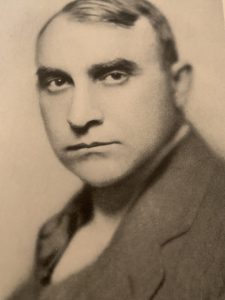 Clyde L. Eddy (1889-1954) Eddy first was introduced to the Grand Canyon during his honeymoon in 1919. Coincidentally this is the same year that Grand Canyon National Park was designated. In 1927 Eddy organized and led his own expedition down the Colorado River through the Grand Canyon. The expedition included “Cataract,” a bear cub and “Rags,” an aerdale dog in addition to the 13 men. The reason for the expedition was adventure.
Clyde L. Eddy (1889-1954) Eddy first was introduced to the Grand Canyon during his honeymoon in 1919. Coincidentally this is the same year that Grand Canyon National Park was designated. In 1927 Eddy organized and led his own expedition down the Colorado River through the Grand Canyon. The expedition included “Cataract,” a bear cub and “Rags,” an aerdale dog in addition to the 13 men. The reason for the expedition was adventure.
#63 “To-night is very lovely,
The river is swelling by,
And high above the canyon walls
A cloud flecked, sunset sky.”
–Clyde Eddy
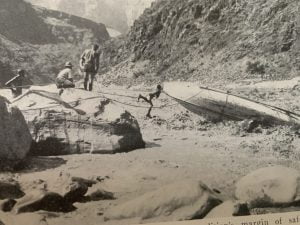 #64 “The Powell caught broadside in the current, had been carried down against the outermost of the rocks thirty feet from the shore and was wedged there, her stern submerged beneath the rushing water, her bow thrust high up in the air, with the weight of the river pouring into her open after compartment. And there she stayed, swaying in the current, resisting our united efforts to drag her off. We tugged and hauled in vain.”
#64 “The Powell caught broadside in the current, had been carried down against the outermost of the rocks thirty feet from the shore and was wedged there, her stern submerged beneath the rushing water, her bow thrust high up in the air, with the weight of the river pouring into her open after compartment. And there she stayed, swaying in the current, resisting our united efforts to drag her off. We tugged and hauled in vain.”
–Clyde Eddy
#65 “Explorers Wanted
Volunteers are wanted for an important geological-geographical expedition scheduled to leave New York City about June 10, to be gone 6 or 8 weeks. Preference will be given to men who have had outdoor experience and no one will be accepted who cannot swim, handle a boat, do his share of camp “chores” and handle himself in the woods. No one should apply who is afraid of cold, or of high altitudes. A fine opportunity for geology students, or younger members of teaching faculties, to do field work in virgin territory.
No salaries will be paid but rations, transportation and camp equipment will be supplied. Each member of the expedition will have to furnish his personal equipment, and will have to pay his own fare to the point where the expedition leaves the railroad. In applying to join the party, state whether or not you are an American citizen.
Send photograph and complete biographical information in your first letter.”
–Clyde Eddy’s recruitment letter for his 1929 Grand Canyon Expedition
![]()
 Glen and Bessie Hyde (Disappeared, Grand Canyon 1928)-Glen and Bessie Hyde were newlyweds who disappeared while attempting to run the rapids of the Colorado River through Grand Canyon, Arizona in 1928. Had the couple succeeded, Bessie Hyde would have been the first woman known to accomplish this feat.
Glen and Bessie Hyde (Disappeared, Grand Canyon 1928)-Glen and Bessie Hyde were newlyweds who disappeared while attempting to run the rapids of the Colorado River through Grand Canyon, Arizona in 1928. Had the couple succeeded, Bessie Hyde would have been the first woman known to accomplish this feat.
#66. “We of the night will know many things of which you sleepers will never dream.” — Bessie Hyde
#67.
“Oh! Mamma dear, please come!
My dolly must be drowned,
When I put her on the creek,
She sunk without a sound.
Wee Betty’s eyes filled with tears,
Where could poor dolly be?
Perhaps she’d turned into a mermaid,
And drifted out to sea.”
–Bessie Hyde
#68 “Got Caught in eddy and then stayed up with boat all night.”–Bessie Hyde
#69 “Spent all day getting boat on rocks. Smashed Sweeps.”–Bessie Hyde talking about portaging Bedrock Rapid in really low water.
![]()
 Haldane “Buzz” Holmstrom (1909–1946) was a pioneer of running the Colorado River through the Grand Canyon. He was the first person to float all the way from Green River, Wyoming to Boulder Dam solo. He built his own rowboats, often of his own design, to run whitewater rivers.
Haldane “Buzz” Holmstrom (1909–1946) was a pioneer of running the Colorado River through the Grand Canyon. He was the first person to float all the way from Green River, Wyoming to Boulder Dam solo. He built his own rowboats, often of his own design, to run whitewater rivers.
#70 “Camp on right at lower end Rapid – mile 247 with the last bad one above me – the Bad Rapid – Lava Cliff – that I have been looking for – nearly a thousand miles.
I had thought – once past there – my reward will begin – but now – everything ahead seems kind of empty & I find I have already had my reward – in the doing of the thing – the stars & cliffs & canyons – the roar of the rapids – the moon – the uncertainty – worry – the relief when through each one – the campfires at nite – the real respect & friendship of the river men I met & others.
This may be my last camp where the roar of a real rapid is echoed from the cliffs around & I can look at the stars & moon only through a narrow slit in the earth.
The river & Canyons have been kind to me – I think my greatest danger is ahead – that I might get swellheaded over this thing – I am going to try to keep my mouth shut about it – go back to work in the old way & have it only for a memory for myself – I have done no one any good & caused a few people great worry & suffering I know.
I think this river is not treacherous as has been said – Every rapid speaks plainly just what it is & what it will do to a person & a boat in its currents waves boils whirlpools & rocks – if only one will read & listen carefully – It demands respect – & will punish those who do not treat it properly – some places it says – go here safely if you do it just this way – & in others it says – do not go here at all with the type of boat you have – but many people will not believe what it says.
Some people have said “I conquered the Colorado River’ – I don’t say so – It has never been conquered – & never will I think – anyone who it allows to go through its canyons & see its wonders should feel thankful & privileged. …
I know I have got more out of this trip by being alone than if a party was along as I have more time – especially at nite – to listen & look & think & wonder about the natural wonders rather than listen to talk of war politics & football scores.
The River probably thought – he is such a lonesome ignorant unimportant & insignificant pitiful little creature – with such a short time to live that I will let him go this time & try to teach him something – It has not been so kind to many prouder people than I. …”–Buzz Holmstrom
![]()
Henry David Thoreau–Henry David Thoreau (July 12, 1817 – May 6, 1862) was an American essayist, poet, and philosopher. A leading transcendentalist, he is best known for his book Walden, a reflection upon simple living in natural surroundings, and his essay “Civil Disobedience” (originally published as “Resistance to Civil Government”), an argument for disobedience to an unjust state.
#71 “There are moments when all anxiety and stated toil are becalmed in the infinite leisure and repose of nature.”
–Henry David Thoreau
#72 “The finest workers in stone are not copper or steel tools, but the gentle touches of air and water working at their leisure with a liberal allowance of time.”
#73 “Water is a pioneer which the settler follows, taking advantage of its improvements.”
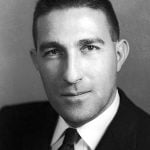 Stewart Lee Udall (January 31, 1920 – March 20, 2010) was an American politician and later, a federal government official. After serving three terms as a congressman from Arizona, he served as Secretary of the Interior from 1961 to 1969, under presidents John F. Kennedy and Lyndon B. Johnson.
Stewart Lee Udall (January 31, 1920 – March 20, 2010) was an American politician and later, a federal government official. After serving three terms as a congressman from Arizona, he served as Secretary of the Interior from 1961 to 1969, under presidents John F. Kennedy and Lyndon B. Johnson.
#78 “If you want inner peace, find it in solitude, not speed, and if you would find yourself, look to the land from which you came and to which you go.”
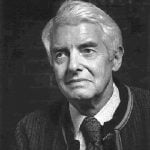 David Ross Brower (July 1, 1912 – November 5, 2000) was a prominent environmentalist and the founder of many environmental organizations, including the John Muir Institute for Environmental Studies, Friends of the Earth (1969), Earth Island Institute (1982), North Cascades Conservation Council, and Fate of the Earth Conferences. From 1952 to 1969, he served as the first Executive Director of the Sierra Club, and served on its board three times: from 1941–1953; 1983–1988; and 1995–2000. As a younger man, he was a prominent mountaineer.
David Ross Brower (July 1, 1912 – November 5, 2000) was a prominent environmentalist and the founder of many environmental organizations, including the John Muir Institute for Environmental Studies, Friends of the Earth (1969), Earth Island Institute (1982), North Cascades Conservation Council, and Fate of the Earth Conferences. From 1952 to 1969, he served as the first Executive Director of the Sierra Club, and served on its board three times: from 1941–1953; 1983–1988; and 1995–2000. As a younger man, he was a prominent mountaineer.
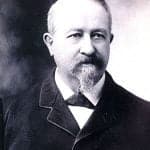 Clarence Edward Dutton (May 15, 1841 – January 4, 1912) was an American geologist and US Army officer. Dutton was born in Wallingford, Connecticut on May 15, 1841. He graduated from Yale College in 1860 and took postgraduate courses there until 1862, when he enlisted in the 21st Connecticut Volunteer Infantry; he fought at Fredericksburg, Suffolk, Nashville and Petersburg. In 1875, he began work as a geologist for the U.S. Geological Survey. Working chiefly in the Colorado Plateau region, he wrote several classic papers, including geological studies of the high plateaus of Utah (1879–80), the Cenozoic history of the Grand Canyon district (1882), and the Charleston, South Carolina, earthquake of 1886.
Clarence Edward Dutton (May 15, 1841 – January 4, 1912) was an American geologist and US Army officer. Dutton was born in Wallingford, Connecticut on May 15, 1841. He graduated from Yale College in 1860 and took postgraduate courses there until 1862, when he enlisted in the 21st Connecticut Volunteer Infantry; he fought at Fredericksburg, Suffolk, Nashville and Petersburg. In 1875, he began work as a geologist for the U.S. Geological Survey. Working chiefly in the Colorado Plateau region, he wrote several classic papers, including geological studies of the high plateaus of Utah (1879–80), the Cenozoic history of the Grand Canyon district (1882), and the Charleston, South Carolina, earthquake of 1886.
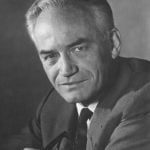 Barry Morris Goldwater (January 2, 1909 – May 29, 1998) was an American politician, businessman, and author who was a five-term Senator from Arizona (1953–1965, 1969–1987) and the Republican Party nominee for president of the United States in 1964. Despite his loss of the 1964 presidential election in a landslide, Goldwater is the politician most often credited with having sparked the resurgence of the American conservative political movement in the 1960s. He also had a substantial impact on the libertarian movement.
Barry Morris Goldwater (January 2, 1909 – May 29, 1998) was an American politician, businessman, and author who was a five-term Senator from Arizona (1953–1965, 1969–1987) and the Republican Party nominee for president of the United States in 1964. Despite his loss of the 1964 presidential election in a landslide, Goldwater is the politician most often credited with having sparked the resurgence of the American conservative political movement in the 1960s. He also had a substantial impact on the libertarian movement.
#89 “Well, once you’ve been in the Canyon and once you’ve sort of fallen in love with it, it never ends…it’s always been a fascinating place to me, in fact I’ve often said that if I ever had a mistress it would be the Grand Canyon.”
 Joseph Christmas Ives (25 December 1829 – 12 November 1868) was an American soldier, botanist, and an explorer of the Colorado River in 1858.
Joseph Christmas Ives (25 December 1829 – 12 November 1868) was an American soldier, botanist, and an explorer of the Colorado River in 1858.
#90 “The extent and magnitude of the system of canyons is astounding. The plateau is cut into shreds by these gigantic chasms, and resembles a vast ruin. Belts of country miles in width have been swept away, leaving only isolated mountains standing in the gap. Fissures so profound that the eye cannot penetrate their depths are separated by walls whose thickness one can almost span, and slender spires that seem to be tottering upon their bases shoot up thousands of feet from the vaults below.”
–Army First Lieutenant Joseph Christmas Ives
#91 “The region is, of course, altogether valueless. It can be approached only from the south, and after entering it there is nothing to do but leave. Ours has been the first, and will doubtless be the last, party of whites to visit this profitless locality. It seems intended by nature that the Colorado river, along the greater portion of its lonely and majestic way, shall be forever unvisited and undisturbed.”
–Army First Lieutenant Joseph Christmas Ives
![]()
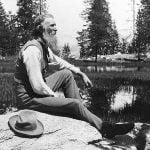 John Muir ( April 21, 1838 – December 24, 1914) also known as “John of the Mountains” and “Father of the National Parks”, was an influential Scottish-America naturalist, author, environmental philosopher, glaciologist, and early advocate for the preservation of wilderness in the United States of America.
John Muir ( April 21, 1838 – December 24, 1914) also known as “John of the Mountains” and “Father of the National Parks”, was an influential Scottish-America naturalist, author, environmental philosopher, glaciologist, and early advocate for the preservation of wilderness in the United States of America.
#92 “The world is big and I want to have a good look at it before it gets dark.”
–John Muir
#93 “I only went out for a walk and finally concluded to stay out till sundown, for going out, I found, was really going in.”
–John Muir
#94 “Only by going alone in silence, without baggage, can one truly get into the heart of the wilderness. All other travel is mere dust and hotels and baggage and chatter.”
–John Muir
#95 “To the lover of wilderness, Alaska is one of the most wonderful countries in the world.”
–John Muir
![]()
 Georgie White Clark (1911–1992) was a river-running guide in the Grand Canyon. She was the first woman to run the Grand Canyon as a commercial enterprise, and she introduced several innovations and adjustments to the way that guides ran the Colorado. In particular, she used large army-surplus rafts, often lashing together multiple rafts, to maintain stability in the large rapids. In 2001, the United States Board on Geographic Names renamed Mile 24 Rapid in her honor.
Georgie White Clark (1911–1992) was a river-running guide in the Grand Canyon. She was the first woman to run the Grand Canyon as a commercial enterprise, and she introduced several innovations and adjustments to the way that guides ran the Colorado. In particular, she used large army-surplus rafts, often lashing together multiple rafts, to maintain stability in the large rapids. In 2001, the United States Board on Geographic Names renamed Mile 24 Rapid in her honor.
#96 “I like it because I’m naturally that way —I like to MOVE and I like to GO.”
–Georgie White
#97 “I like people and I like to give ’em enjoyment. I like to show ’em the river. They get a kick out of it.”
–Georgie White
#98 “I fell in love with the river, married it, and I don’t plan no divorce”
–Georgie White
#99 “They don’t make passengers the way they used to.”
–Georgie White
If you have any questions or to book an adventure today please call us at (800) 253-7328.
Grand Canyon River Rafting Recommendations
Spring Hiking & Rafting Special
The focus is on off-river hiking and exploration.
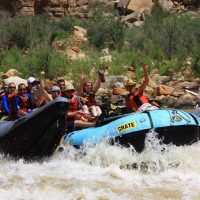
Our classic Grand Canyon rafting expedition. It offers ample time to see the sites and side canyons.
18-Foot rafts are rowed by guides. A paddle raft is available on a rotation basis.
Grand Canyon Rafting combined with a stay at the Bar 10 Ranch.
Home » Rafting Down the River with CRATE » River History & Quotes
CRATE Rafting Trips Since 1971
Free PDF copy of our Rafting Brochure!

